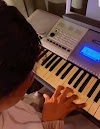### Read This if You Just Started Learning Piano Less Than a Month Ago.
If you’ve just started learning the piano, you’re embarking on a rewarding journey that offers numerous benefits. Whether you’re learning for fun, personal enrichment, or to pursue a career in music, the piano is a fantastic instrument to master. Here’s a guide to help you get started, including a simple tutorial and tips to keep you motivated.
### Why Learn the Piano?
1. **Mental Benefits**: Learning piano enhances cognitive abilities, including memory, attention, and problem-solving skills. It stimulates both sides of the brain, fostering creativity and logical thinking.
2. **Emotional Benefits**: Playing piano can be a great stress reliever. It provides an emotional outlet and can improve your mood.
3. **Physical Benefits**: Piano playing improves hand-eye coordination, fine motor skills, and dexterity.
4. **Social Benefits**: Joining music groups or playing with others can boost your social interactions and build connections.
### Getting Started: The Basics
#### 1. Understanding the Keyboard
- The piano keyboard consists of repeating sets of 12 keys: 7 white and 5 black keys.
- The white keys are named A, B, C, D, E, F, and G.
- The black keys are grouped in sets of twos and threes and are named sharps (#) or flats (b).
#### 2. Your First Chord: C Major
The C major chord is a great starting point. It’s simple and forms the basis for many other chords.
**Step-by-Step Tutorial to Play the C Major Chord:**
1. **Find Middle C**: Locate the group of two black keys in the middle of the keyboard. The white key immediately to the left is Middle C.
2. **Position Your Hand**: Place your right-hand thumb on C, your middle finger on E, and your pinky finger on G.
3. **Play the Chord**: Press C, E, and G simultaneously. Congratulations, you’ve played the C major chord!
#### 3. Practice Tips
- **Start Slow**: Take your time to get comfortable with the keys and your hand positions.
- **Short Sessions**: Practice for 10-15 minutes at a time, several times a day, rather than one long session.
- **Use Both Hands**: Even if you’re starting with one hand, try to get both hands involved early to develop coordination.
### Encouragement and Tips
1. **Set Realistic Goals**: Don’t expect to play complex pieces right away. Set small, achievable goals and celebrate each success.
2. **Regular Practice**: Consistency is key. Regular practice, even for short periods, is more effective than occasional long sessions.
3. **Stay Positive**: Learning an instrument takes time and patience. Stay positive and enjoy the process. Remember that every expert was once a beginner.
4. **Use Online Resources**: There are numerous online tutorials, apps, and videos to help you learn and stay motivated.
### Advantages of Learning the Piano
- **Versatility**: The piano is used in various musical genres, from classical to pop, jazz, and more.
- **Foundation for Other Instruments**: Understanding the piano can make learning other instruments easier.
- **Improved Focus**: Practicing piano enhances concentration and discipline.
- **Joy and Fulfillment**: Playing music brings immense personal satisfaction and joy.
### Final Thoughts
Starting to learn the piano is an exciting adventure. It might feel challenging at times, but every small step you take brings you closer to your goal. That is why you should follow Vicpiano to learn piano stuffs every day to aid you . Don't forget to share this post.










0 Comments